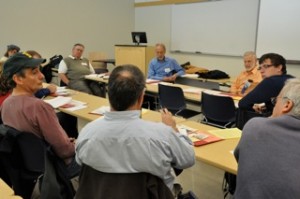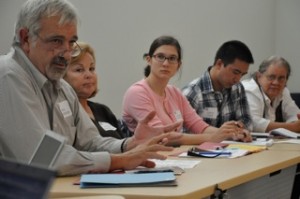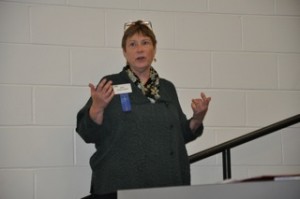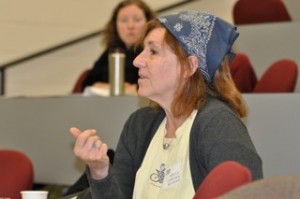Here are summaries of just some of the stimulating workshops held at CPS’s Fall Issues Conference. Thanks to Larry Aaronson for the wonderful photos of these and other parts of the conference.
Reform MCAS Now Workshop
Participants in this workshop considered what it will take to win the battle to reform the high-stakes MCAS. They discussed the fact that it is principally teachers and parents who have been most active in efforts to change high stakes testing in Massachusetts. However, the younger generation of recent high school graduates, who have taken the MCAS, can be a potent force for change. Â We need to a better job of reaching out to these individuals by means of Internet publications and social media outlets, such as Facebook. The group also discussed promising alternative assessment methods to the MCAS. Ultimately, the group concluded that in order to reform high-stakes testing the public must be made aware of the flaws of MCAS and the advantages of an alternative system. Several means of accomplishing this goal were discussed, including writing or responding to online articles and editorials.
–Ryan West
Resisting Privatization and Profiteering Workshop
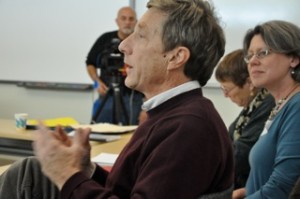
Researcher Paul Dunphy provided perspective on the charter school movement's impact on public education.
Researcher Paul Dunphy provided context for a productive discussion about the threats of privatization and profiteering to our public schools. Going back to the 1993 Ed Reform bill, which opened the door to private management of publicly funded schools in Massachusetts, Dunphy described how a charter proposal affected his western Massachusetts community, where a group of privileged families sought to create an elite learning center with public funds that would be drawn away from state funds for existing public schools. Now, in the wake of the newly passed “Achievement Gap” bill, Boston sees $60 million this year–minus short term reimbursements–drawn out of the city’s state education aid to support charters. In contrast to the democratic oversight of traditional public schools, with policies set by elected school committees, Dunphy has come to see charters as being anti-democratic, in that they allow “small groups of parents to start a school that would draw funds without debate or consensus.”
A well-informed group of teachers, union representatives, graduate students and parents added detail and analysis to the background offered by Dunphy. Richard Stutman, president of the Boston Teachers Union, warned that charters will lead to school vouchers. Stutman noted that it isn’t accurate to say that students are leaving traditional Boston public schools and the money follows. “Half the students in Boston charter schools came from parochial schools,” Stutman said. “We are in trouble.” Chemistry teacher Mary Porter warned charters were the privatizers’ foot in the door and “now they’re halfway in control of our public schools already.”
Conference Chair Jonathan King reminded the group that while we may know what’s going on, others don’t, in part because press coverage has been so weak. “You can’t fight a war by being courageous, you’ve got to have weapons,” King said. “We can’t just sit here. We have to let others know. That’s why you have to have independent organizations like CPS.”
–Lisa Guisbond
“Willing To Be Disturbed” Workshop
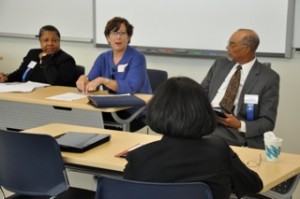
Assistant Superintendent Eileen de los Reyes addressed participants in the 'Willing to be Disturbed' workshop regarding Engligh language learners in Boston public schools.
Eileen de los Reyes, assistant superintendent of the city’s schools, said English language learners in Boston schools will finally get the educational services they need and deserve, as a result of a recent out-of-court settlement agreement between the U.S. Justice Department and the Boston School Department.
She spoke to participants in the lively late-morning workshop “Willing to be Disturbed,” which expanded on the opening session’s theme of how the struggle for equity in our schools is unfolding. As Barbara Fields, CPS board member and workshop moderator said, “If we are going to provide the type of education we want for our children, we have to be willing to be disturbed.”
English Language Learners
The assistant superintendent described how her office is beginning to implement the agreement, after a federal investigation determined that Boston schools were violating the civil rights of more than 7,000 ELL students by failing to provide instruction they could understand. Many were assigned to mainstream classes and expected to learn English. “Children do not learn English simply by sitting in a classroom with students who speak English -Â languages are not learned by osmosis,” de los Reyes said.
The agreement requires teacher training across the system, as well as better classroom materials, so that ELL students can learn effectively. Acknowledging the difficulty of transforming the system, de los Reyes said, “Principals, teachers and central office staff are trying to make up for long years of neglect in a short amount of time and under tremendous pressure,” de los Reyes said. “People are working hard, sometimes confused, stressed, angry…” but, she noted later, “From the point of view of the child, it’s totally great.
When asked how the district will handle the issue of English language learners who are also special education students, de los Reyes said that “special ed does not trump ELL.” That is, those students will need teachers who have dual certification. (Two guidance counselors from Worcester nodded emphatically during that comment, as Worcester School Committee member Tracy Novick noted in her excellent blog: http://who-cester.blogspot.com/2010/10-english-language-learners.)
Parent Involvement
Ruth Rodriguez Fay, president of CPS, discussed the importance of working with families in closing the achievement gap. “Too often, it’s just an afterthought,” she noted. Rodriguez Fay was school-community liaison in Worcester. She described the state of bilingual ed in the past—classes in the hallway, taught by long-term substitutes who were not certified—but said that still, the system had been making improvements until the Unz initiative essentially overturned bilingual education in Massachusetts in 2002. While Worcester is still under a consent decree that has somewhat buffered the schools from Unz, the initiative has still had a negative effect.
School-to Prison-Pipeline
William Robinson, chair of the Political Action Committee of the New England Area Conference NAACP, said discipline in our schools depends too much on law enforcement and not enough on engaging the students. “Most of this involves non-violent conduct,” he said, “disruptive conduct, such as disturbing the peace…” He cited a chilling statistic: “One in three black and one in six Latino boys born in 2001 are at risk of imprisonment during their lifetime.” Robinson noted that once students become involved with the criminal justice system, their lives are never the same. “Many get a worse deal than the drug dealers,” he said. “Many parents don’t have the resources to obtain a proper defense.” Much of the solution lies in understanding the kids, realizing that sometimes they are going through a difficult time.
A lively discussion followed, in which those closely connected with urban schools in several cities discussed how to reach parents who see charter schools as the only answer, how to develop “cultural competency” in those teachers who are insensitive to students’ racial and ethnic backgrounds, how to work for an equal distribution of resources in schools across a school system, and how to put forward a positive vision of the kind of education we want for our children.
Barbara Fields, who formerly headed the Office of Equity in Boston Public Schools for 25 years, handed out a policy statement and plan “Eliminating the Achievement Gap” which she and other staff had developed in 2006. She said that while some progress has been made, the policy has never been truly implemented and the measures it recommends are needed now more than ever.
–Jackie King
Raising Public Education Issues in the Legislative Arena
Tom Gosnell, president of the AFT-MA, Julie Johnson, lobbyist with the MTA and William Robinson, New England Area Conference NAACP, helped lead a workshop to discuss state legislative strategy. Robinson presented a proposal to the group for a campaign to pass legislation to address the “School to Prison Pipeline.” Johnson talked about her 20-year experience lobbying public education issues at the State House, and about CPS’ current legislative campaigns, including efforts to reform MCAS, limit charter school expansion and reform charter funding, and increase state funding for education. Gosnell discussed the difficulties in winning legislative campaigns, but focused on the need for public education advocates to continue their work in the legislative arena on both the state and national levels, as well as emphasizing the importance of political campaign work.
A lively discussion ensued among the participants about what legislation should be the focus of a CPS legislative campaign, about the importance (or unimportance) of legislative and political work, and about its complexity. Jack Flannagan, recently retired from the MTA and a lobbyist for teachers for over 35 years, answered questions about the legislative process and stressed how lobbying for public education and educators had changed over the years. Several participants said that they wanted to know more about the legislative process and several more indicated that they were interested in being kept informed about CPS’ legislative agenda and priorities.
–Julie Johnson
Organizing a Reform MCAS Now Event
Ann O’ Halloran and Jonathan King led an afternoon workshop devoted to planning regional MCAS Reform events. They presented plans for local events of diverse size and character anchored by Professor Louis Kruger’s “Children Left Behind” documentary and Ann’s talk, with the local organizers, school committee member, union leader, or state representatives offering local perspectives.
Worcester was chosen as a high-priority venue, with Paul Caswell, vice president of the Worcester Education Association, offering to propose an MCAS Reform event at his next executive board meeting. This event could tap the connections of Tracy Novick, a Worcester School Committee member, and the many Worcester contacts of Ruth Rodriguez Fay and Melissa Colon.
After Worcester, our next effort will focus on the Pioneer Valley, through University of Massachusetts Prof. Amanda Walker Johnson and the strong local PHENOM group that organized the Save our Schools conference at UMass/ Amherst last spring.
Third on the list is Springfield MA, then Taunton, Concord, Quincy and Brockton. As these events become solidified they will be posted on a CPS “Events” web page.
—Jonathan King
Leaving Superman Behind: Workshop Tackles the Movie
The controversial documentary “Waiting for Superman” by Davis Guggenheim sparked a spirited discussion in the afternoon workshop of the same name at the CPS issues conference. Nella LaRosa Waters and Larry Aaronson, both long-time teachers in urban school systems, opened the session with a description of the movie’s narrative and an outline of its inaccuracies, omissions and distortions.
They and other participants noted many of the film’s false propositions: that most public schools are failing; that most charter schools are superior to public schools and are the only hope for children from low-income and minority communities; that test scores are a surefire way to evaluate how students and schools are progressing; that “money is not the answer” in the effort to help public education – “we’ve tried that and it doesn’t work”; that good teaching consists of figuratively opening a child’s head and pouring in facts; that many or most public school teachers are lazy, ineffective, and motivated solely by self-interest; that these bad teachers—and the unions that protect them—are the greatest obstacles to education “reform” of the kind sought by public figures such as Michelle Rhee, former chancellor of the Washington, D.C. school system.
There was disagreement about the movie’s effectiveness as a propaganda vehicle: some found it is too disjointed to make a coherent case; others thought its focus on the plight of five public school children and their families does, at least, deeply engage viewers’ emotions. Most agreed that the final long sequence in which the families are waiting to hear whether their child will win the lottery for admission to a charter school, with the implication that this one event could determine the child’s success or failure in life, is shamelessly manipulative.
Workshop participants had many good ideas about how to counter the film’s message: join an ongoing CPS leafleting campaign at local movie theaters; write letters to the editor and op-ed pieces for local newspapers in response to reviews of the film; support the making of high-quality documentaries that get out the truth about public schools, such as “TEACH” by Robert Flame Lamothe. Film festivals, drum and dance events, use of YouTube and other social media were all encouraged as avenues to reach young people. For a more in-depth discussion of the movie, visit the Waiting for Superman section of the CPS website: www.citizensforpublicschools.org.
–Jackie King
Reaching out to Local Media-Using Social Media Workshop
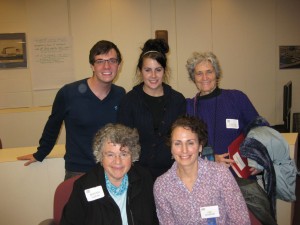
Facilitators Miriam Stein, left, and Lisa Guisbond, in front. In back, from left to right, Ryan West, Megan Owen and Eleanor Duckworth.
A diverse group with deep experience and knowledge shared ideas and strategies on reaching out to local media of all kinds and then had a presentation on how to bring social media into the mix. Consultant and longtime activist Miriam Stein and Lisa Guisbond facilitated the discussion, with the help of former teacher and Worcester School Committee member Tracy Novick.
The group proposed a mix of strategies, including
- Expanding our base by tapping into a coalition of college students and education students in particular.
- Reaching out to local daily and weekly newspapers by building relationships with local reporters.
- Developing a media strategy that focuses on regional papers more than the Boston Globe and Boston Herald, which have been pushing charters and testing.
- Posting a list of regional newspapers with editorial policies and submission guidelines to the CPS web site.
- Disseminating a list of talk radio programs and alerting members to relevant topics so they can call in and challenge the dominant narrative on schools.
Northeastern Students Ryan West and Megan Owen presented a Facebook page called Students for MCAS Reform and described how we might capitalize on the power of Facebook to grow our network and get the word out.
–Lisa Guisbond
[To return to The Backpack, close browser page.]
